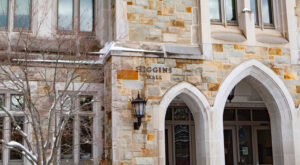Boston College students joined Climate Justice at Boston College (CJBC) and FACES for a rally on the Quad on Monday, calling on both the University and the federal government to take stronger action on climate change.
“If BC wants Jesuit, liberal education to remain relevant, it needs to make its catchphrases more than just catchphrases,” said Emily Ternynck, co-president of CJBC and MCAS ’25, at the rally. “Setting the world aflame means being at the forefront of social change. Men and women for others means choosing ethics over profit. Caring for the common good means making sure that the planet is around for future generations.”
Speakers at the rally stressed that recent federal funding cuts under Trump have hindered climate action efforts nationwide.
“President Trump started his second term in office by vowing to slash and burn federal spending,” said Ava Podany, CJBC’s action and events coordinator and MCAS ’26. “Some of the main targets of these funding cuts have been anything related to environmental protection, climate change, or DEI measures. Projects meant to help environmental justice communities adapt to and mitigate climate change suddenly stopped receiving the promised funds.”
Organizers shared a statement signed by BC alumni and past members of CJBC that criticized University President Rev. William P. Leahy, S.J., for his stances on resources for LGBTQ+ students and divestment from fossil fuels.
“We further recognize university president, Fr. Leahy, S.J. as a major impediment to all kinds of changes the university desires, including LGBTQ+ recognition and support and, of course, fossil fuel divestment,” the alumni wrote. “While his extended retirement announcement is welcome, we remain wary of his hand-picked trustees and administrators.”
The alumni signatories expressed cautious optimism that when Rev. John “Jack” Butler, S.J., assumes the University presidency in 2026, he can take a more engaged approach to the issues at hand.
“We hope Fr. Butler, S.J. reaches out for true engagement with CJBC, students and alumni, and thoughtfully and swiftly considers fossil fuel divestment,” they wrote. “Regardless, our position is as clear as it has ever been and we remain steadfast in our commitment to it.”
Speakers also condemned the Trump administration’s targeting of research funding, which has disrupted and paused research initiatives in various fields at institutions across the country.
“The administration has targeted scientists by halting their grants, specifically focusing on topics the administration finds controversial, such as climate change,” Podany said. “Censoring science will only serve to harm our country, and co-opting scientists so they will conform to the Trump administration’s ideological viewpoints is both dangerous and deplorable.”
Thomas Vosganian, political director of BC College Democrats and MCAS ’28, joined the rally as a guest speaker, criticizing the University for maintaining what he called a false appearance of being “apolitical” while continuing to take actions that contradict its stated values.
“I don’t think it’s very ‘apolitical’ to host the CEO of Chevron or Exxon to give talks on campus,” Vosganian said. “I don’t think it’s very ‘apolitical’ to refuse to divest from the fossil fuel industry in light of all scientific evidence urging the opposite. But more than that—and call me a radical—I think it should be apolitical to move on from the industrial sector that’s objectively destroying our planet.”
Speakers also criticized the University for what they perceived as failing to uphold its Catholic values, citing the late Pope Francis’s advocacy and writings on climate change.
“Pope Francis himself released multiple encyclicals on the need for Catholic action to fight climate change and protect the environment, specifically calling for Catholic institutions to divest from fossil fuels,” Ternynck said. “How much longer can BC ignore the Pope? Ignore its own values? Ignore its own faith?”
Organizers also condemned the University’s continued inaction, despite over a decade of student advocacy calling for divestment. According to Ternynck, since CJBC began its efforts, many peer institutions—including Harvard, Boston University, Georgetown, and Marquette—have divested from fossil fuels.
“A lot of those schools are our direct competitors,” Ternynck said. “Meanwhile, BC twiddles its thumbs.”
Founded in 2013 and rebranded from BC Fossil Free the following year, CJBC has continuously advocated for divestment and other climate justice initiatives.
University administrators have a history of conflicts with the organization. In 2014, several students received disciplinary probation after hosting an unsanctioned climate change vigil.
Most recently, in 2022, BC placed the organization under probation for violating the Student Code of Conduct after members delivered cards containing vulgar language to University President Rev. William P. Leahy, S.J., as part of a Valentine’s Day–themed demonstration.
In her remarks, Ternynck also referenced BC’s recent rise in the U.S. News & World Report college rankings as a sign the University should begin to embrace more forward-thinking leadership to live to its reputation.
“If BC wants to claim its spot as a leading university, it needs to lead,” Ternynck said. “That means using its economic power to catalyze change instead of holding it back. That means empowering its students to be change makers, not holding them down.”





Leave a Reply